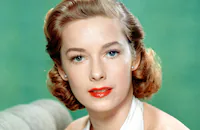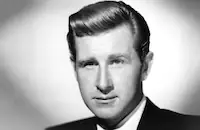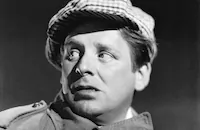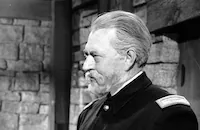Wichita

Brief Synopsis
Cast & Crew
Jacques Tourneur
Joel Mccrea
Vera Miles
Lloyd Bridges
Wallace Ford
Edgar Buchanan
Film Details
Technical Specs

Synopsis
In 1874, Clint Wallace and his foreman, Ben Thompson, are driving their cattle from Texas to Wichita, Kansas, the new trail head of the West, when they meet lone rider Wyatt Earp. The taciturn Wyatt relates that he wants to start a business in Wichita, to which the railroad has just come, and rejects Wallace's job offer. Late at night, Gyp and Hal Clements, two of Wallace's cowhands, steal Wyatt's money, but Wyatt surprises them and retrieves his cash. Thompson, afraid that the quick-drawing Wyatt will shoot the Clementses, pulls a gun on him to make him drop his weapon, and Wyatt then thrashes Gyp in a bare-knuckles fight. Wyatt rides off and soon reaches Wichita, which is bustling with preparations for the arrival of Wallace's many cowhands, who the town hopes will be the first of many. Unable to find a place to stable his horse, Wyatt seeks advice from newspaper publisher Arthur Whiteside, who takes an immediate liking to the stranger when he professes an aversion to saloons and violence. Wyatt accompanies eager reporter Bat Masterson to a ceremony welcoming the railroad to Wichita, at which businessman Sam McCoy, the man largely responsible for the venture, speaks. Wyatt then goes to open a bank account but is interrupted by a gang attempting to rob the bank. While Bat protects Sam's daughter Laurie, who is also present, Wyatt foils the robbery and is asked by Mayor Andrew Hope to become the town's marshal. Wyatt demurs, stating that he is a businessman, not a lawman, but Sam, believing that Wyatt's actions belie his words, advises Hope to ask Wyatt again. Later, Hope and Whiteside speculate about Wyatt's past, which includes a term as marshal of a town overrun by crime. Wyatt had cleaned up the other town after its marshal, Billy Smith, the current marshal of Wichita, was chased out. The next day, the town leaders greet the just-arrived Wallace and Thompson, while the cowhands head for the saloons and dance-hall girls. Wyatt runs across Laurie and escorts her home, cautioning her not to go out alone until after the cowboys depart. As time progresses, the cowboys become drunk and raucous, and soon, led by Thompson and Gyp, begin galloping through the streets and shooting into the air. During the "hurrah," as the unruliness is called, a saloon girl is injured and a toddler, fascinated by the noise, is killed as he stands in front of a window. Infuriated, Wyatt demands Billy's badge and a shotgun, and heads into the street alone. Wyatt forcefully tells the culprits to drop their weapons, and although Gyp initially refuses, Thompson realizes that Wyatt will shoot them if they do not comply. Wyatt jails the drunken men, then, knowing that he will be unable to get them convicted of murder, tells Hope that he will make the men leave town. Hope, fearing the loss of the men's business, worries that Wyatt's solution is too drastic. The next morning, Wallace asks Wyatt how much the men's fines will be, and threatens a jail break when Wyatt informs him that he will have to wait until after the trial before his men can be freed. Wyatt promptly arrests Wallace, and although Sam applauds Wyatt's firm handling of the situation, he warns the new marshal that Wichita's prosperity depends upon the cattlemen. Wyatt retorts that he will not stand by while children are murdered, then forces the offenders to leave town. Afterward, Wyatt institutes a ban on firearms within city limits and allows the admiring Bat to act as his deputy until the reinforcements he has sent for arrive. The town leaders, including Sam and saloon owner Doc Black, complain to Hope that Wyatt has gone too far and decide to confront him. At dinner that night at the McCoys, Wyatt and Laurie flirt and plan on picnicking the following day. After dinner, Wyatt grimly tells the men that he will not change his methods of combating violence, and that if they are not satisfied, they will have to fire him. Before they can reply, news comes that some of the errant cowboys have returned to Wichita, and Wyatt goes after them. Wyatt gets the drop on the troublemakers in a saloon, and warns them that if they return, he will not waste time arresting them, but will kill them instead. Later, while Wyatt and Laurie picnic, he professes his feelings for her, stating that he does not want to waste time with demure courting, and Laurie responds with a kiss. In the evening, two gun-toting strangers arrive in town, and Black, assuming that they are the gunslingers he summoned from Wallace's ranch, hires them to kill Wyatt. While the men are laying their plans, Wyatt takes Laurie home, and there, Sam, worried that Laurie could get hurt if an outlaw comes gunning for Wyatt, asks him not to see her again. Wyatt reluctantly agrees, then goes to Black's saloon, where Black is mortified to learn that the two strangers are Wyatt's brothers, Morgan and Jim. An infuriated Black vows vengeance as he is forced to leave town, then meets with Clements and his cohort Al. Meanwhile, Laurie seeks out Wyatt, and he explains why her father has prohibited their relationship. He walks her home and there is confronted by Sam and Hope. Much to Sam's surprise, Hope supports Wyatt's law-and-order methods and refuses to fire him. After the men quarrel, Wyatt leaves but is shot at by Black, Clements and Al. Mary, Sam's wife, is hit by a stray bullet and killed instantly. Accompanied by his brothers, Bat and Whiteside, Wyatt pursues the killers and succeeds in shooting Clements and Al. Black escapes and travels to the Wallace ranch, where he incites the men by lying about Wyatt's actions. Believing that Wyatt killed his brother in cold-blood, Gyp heads a group of men riding to Wichita, but upon their arrival, the men learn the truth about Mary's murder. Sam, who now regrets his harsh words against Wyatt, stands beside the marshal as he faces the men. When Gyp insists on a duel, Wyatt outdraws and kills him. Black then attempts to shoot Wyatt, but Sam shoots him first. As the rest of Wallace's men leave, Sam and Wyatt shake hands, and soon after, Laurie and Wyatt are married. While watching the bride and groom wave goodbye, Sam shakes his head, telling Whiteside that he tried to persuade Wyatt not to leave Wichita for a new job as marshal of Dodge City.

Director

Jacques Tourneur
Cast

Joel Mccrea

Vera Miles

Lloyd Bridges

Wallace Ford

Edgar Buchanan

Peter Graves

Keith Larsen

Carl Benton Reid
John Smith
Walter Coy

Robert Wilke
Jack Elam

Mae Clarke

Walter Sande
Gene Wesson
Rayford Barnes
George Sherwood
I. Stanford Jolley
William Newell
Charles Morton

Sam Peckinpah
Bob Swan
Rory Mallinson
Dorothy Tennant
Al Wyatt
Alex Sharp
Anna Navarro
George De Normand
Coleen Vico
Adele Taylor
Cathy Marlowe
Chester Jones
Jody Mccrea
Jeanne Dean
Mary Alan Hokanson
Frank Hagney

Gertrude Astor
Crew
William Austin
William Beaudine Jr.
Ralph Butler
Mary Chaffee
John Chalay
Robert Dawn
Sam Gordon
Del Harris
Richard Heermance
Austen Jewell
Joseph Kish
Harold Lipstein
David Milton
Walter Mirisch
Fred Morgan
Teddy Mossman
Eve Newman
Mark Phillips
Edward Polo
Paul Price
Milt Rice
Hans Salter
Hans Salter
Dwan Spencer
Daniel B. Ullman
Ned Washington
Mary Westmoreland
Allen K. Wood
Darrell Woodhouse

Videos
Movie Clip



Film Details
Technical Specs

Articles
Wichita
By Richard Harland Smith

Wichita
Quotes
Trivia
Notes
The film is loosely based on the life of Wyatt Earp (19 March 1848-13 January 1929), who served as a police officer in Wichita, KS, for a brief period of time, circa 1874-1876. For more information on films about Wyatt Earp, please consult the entries for the 1934 Fox production Frontier Marshal in AFI Catalog of Feature Films, 1931-40 and the 1946 Twentieth Century-Fox picture My Darling Clementine in AFI Catalog of Feature Films, 1941-50.
According to studio publicity and Hollywood Reporter news items and production charts, location sites for the production included Arizona and Newhall, Thousand Oaks, Sonora and Modesto, CA, as well as California's Sierra Nevada foothills. Studio publicity noted that the picture marked the motion picture acting debut of Joel McCrea's son Jody, who had previously appeared as a stunt double in one of his father's films. [Some contemporary sources refer to Jody McCrea as "Jode."] Modern sources add Kermit Maynard to the cast. Wichita was Allied Artist's first CinemaScope production.

Miscellaneous Notes
Released in United States Summer July 1955
CinemaScope
Released in United States Summer July 1955













